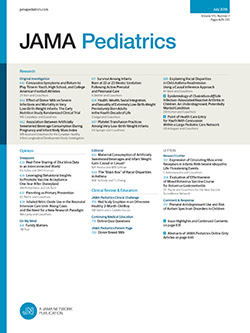青春期对性别确认医疗服务的满意度和遗憾度
IF 24.7
1区 医学
Q1 PEDIATRICS
引用次数: 0
摘要
重要性需要改进为青少年提供的性别确认医疗护理的证据基础,包括接受过这种护理的青少年的经历。目的研究作为性别确认医疗护理的一部分,接受过青春期阻断剂和/或性别确认激素的青少年对护理的满意率、后悔率和连续性。这项调查研究使用了正在进行的纵向研究 "变性青少年项目 "的2023年在线调查波,调查对象是2013年至2017年期间在美国和加拿大各地初步招募的变性青少年及其父母的社区样本。满意度和遗憾度数据包括一名青年或其家长的回复,该青年或其家长代表了队列中 87% 接受过性别确认医疗护理的 12 岁或以上青年(269 名青年中的 235 名)。其中,220 人完成了 2023 年的调查(主要样本);所有青少年都提供了有关持续护理的信息。数据分析于 2024 年 4 月至 8 月进行。暴露青春期阻断剂或抑制剂和/或性别确认激素治疗后的满意度、遗憾以及治疗的持续性。主要结果和测量自我或父母报告对性别确认治疗的满意度或遗憾以及治疗的持续性。结果在主要样本的 220 名青少年中(平均 [SD] 年龄为 16.07 [2.40] 岁;30 [14%] 多种族,非西班牙裔;18 [8%] 白人,西班牙裔;155 [70%] 白人,非西班牙裔;17 [8%] 其他种族和民族,包括亚裔、黑人 [西班牙裔和非西班牙裔]、种族不明的西班牙裔、多种族西班牙裔或美洲原住民;最后一次互动时的性别:68[31%]名男孩,132[60%]名女孩,20[9%]名不同性别者,如:非二元性别者)及其父母,对青春期阻断剂和性别确认激素的满意度非常高,后悔程度很低,继续接受治疗的比例也很高。在主要样本中的 220 名受访者中,有 9 人对接受青春期阻断剂(8 人)和/或激素(3 人;其中 2 人对两种药物都感到后悔)感到后悔,其中 4 人已停止所有性别确认医疗护理,1 人继续接受青春期阻断剂,但计划停止。结论和相关性研究结果表明,作为性别确认医疗服务的一部分,接受青春期阻断剂和荷尔蒙治疗的青少年在几年后往往会对这种治疗感到满意,而不会后悔。虽然后悔的情况很少见,但我们需要更好地了解这些经历。本文章由计算机程序翻译,如有差异,请以英文原文为准。
Levels of Satisfaction and Regret With Gender-Affirming Medical Care in Adolescence
ImportanceThere is a need to improve the evidence base for gender-affirming medical care provided to adolescents, including the experiences of those who have received this care.ObjectiveTo examine rates of satisfaction, regret, and continuity of care in adolescents who received puberty blockers and/or gender-affirming hormones as part of gender-affirming medical care.Design, Setting, and ParticipantsThis survey study used the 2023 online survey wave of an ongoing longitudinal study, the Trans Youth Project, among a community-based sample of transgender youth and their parents initially recruited throughout the US and Canada between 2013 and 2017. The satisfaction and regret data include responses from a youth or their parent representing 87% of the youth aged 12 years or older in the cohort who have received gender-affirming medical care (235 of 269 youths). Of these, 220 completed the 2023 survey (main sample); information about continuity of care was available for all youth. Data analysis was performed from April to August 2024.ExposureSatisfaction, regret, and continuity of care following puberty blockers or suppression and/or gender-affirming hormones.Main Outcomes and MeasuresSelf- or parent-reported satisfaction or regret with gender-affirming care and continuation of care.ResultsAmong the 220 youths in the main sample (mean [SD] age, 16.07 [2.40] years; 30 [14%] multiracial, non-Hispanic; 18 [8%] White, Hispanic; 155 [70%] White, non-Hispanic; 17 [8%] other race and ethnicity, including Asian, Black [Hispanic and non-Hispanic], Hispanic with unknown race, multiracial Hispanic, or Native American; gender at last interaction: 68 [31%] boys, 132 [60%] girls, 20 [9%] gender diverse, eg, nonbinary) and their parents, very high levels of satisfaction and low levels of regret with puberty blockers and gender-affirming hormones as well as high levels of continuation of care were reported. Of these 220 respondents in the main sample, 9 were regretful of having received blockers (n = 8) and/or hormones (n = 3; 2 of these individuals reported regret with both), of whom 4 have stopped all gender-affirming medical care and 1 has continued to receive blockers but plans to stop. The 4 others have continued care, suggesting that regret is not synonymous with stopping care.Conclusions and RelevanceThe findings suggest that youth accessing puberty blockers and hormones as part of gender-affirming care tend to be satisfied with and not regretful of that care several years later. While regret was rare, these experiences need to be better understood.
求助全文
通过发布文献求助,成功后即可免费获取论文全文。
去求助
来源期刊

JAMA Pediatrics
PEDIATRICS-
CiteScore
31.60
自引率
1.90%
发文量
357
期刊介绍:
JAMA Pediatrics, the oldest continuously published pediatric journal in the US since 1911, is an international peer-reviewed publication and a part of the JAMA Network. Published weekly online and in 12 issues annually, it garners over 8.4 million article views and downloads yearly. All research articles become freely accessible online after 12 months without any author fees, and through the WHO's HINARI program, the online version is accessible to institutions in developing countries.
With a focus on advancing the health of infants, children, and adolescents, JAMA Pediatrics serves as a platform for discussing crucial issues and policies in child and adolescent health care. Leveraging the latest technology, it ensures timely access to information for its readers worldwide.
 求助内容:
求助内容: 应助结果提醒方式:
应助结果提醒方式:


